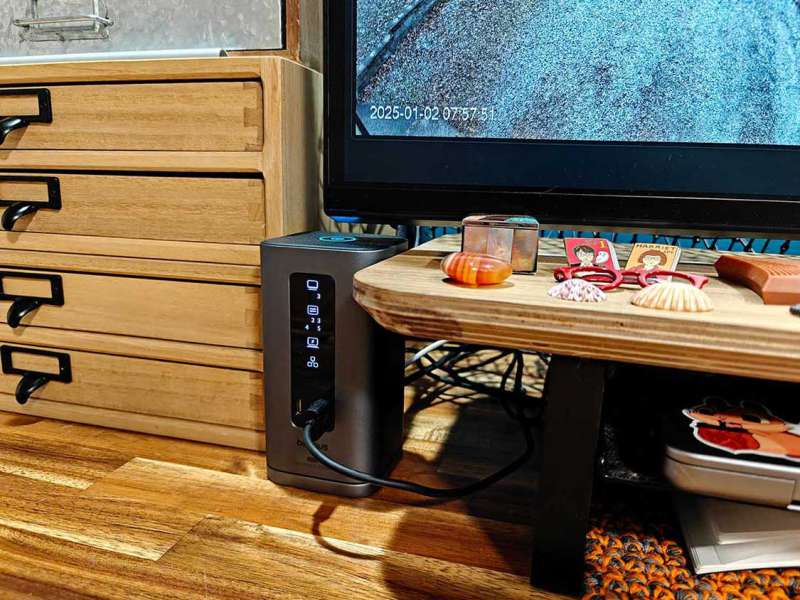
REVIEW – My main computer is a 14 inch Apple MacBook Pro. I use it at my desk hooked up to a 49 inch Ultrawide Dell monitor, a Keychron keyboard, a Logitech MX Master 3S mouse, an Elegato Stream Deck, and a small USB-C dock with a card reader and extra USB ports. To make things easier, I have used the built-in ports on the Dell so that I can connect almost everything via one USB-C cable, but I ran out of ports recently when I decided to start using Ethernet instead of WiFi. When the offer to review the Baseus Spacemate 11-in-1 docking station came up, I was happy to accept it since it offered an Ethernet port and more. Let’s take a look.
⬇︎ Jump to summary (pros/cons)
Price: $199.99
Where to buy: Amazon
What is it?
The Baseus Spacemate, which is available in a Windows and Mac version, is a docking station with a variety of ports including 3 HDMI ports, 2 high-speed USB-C and USB-A 10Gbps data ports, 2 USB-A 480Mbps ports, 100W PD input, gigabit Ethernet, and a 3.5mm AUX jack.
What’s included?
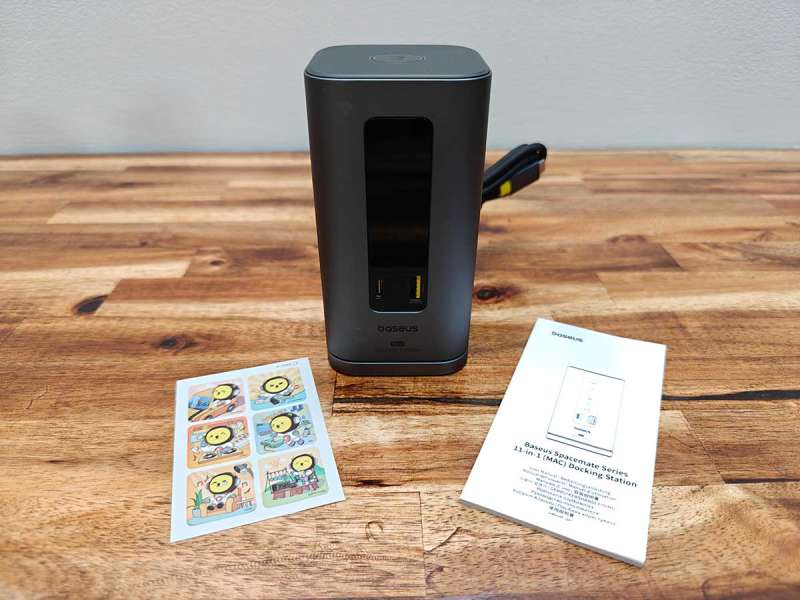
- Baseus Spacemate 11-in-1 docking station
- User manual
Tech Specs
- Name: Baseus Spacemate Series 11-in-1 (MAC) Docking Station
- Model No.: BS-OH175
- Input Port: USB-C
- Output Ports:
- HDMI 1: 4K@60Hz (Max.)
- HDMI 2: 4K@60Hz (Max.)
- HDMI 3: 4K@60Hz (Max.)
- USB-A 3.2 × 2: 10Gbps (Max.)
- USB-C 3.2 × 1: 10Gbps (Max.)
- USB-A 2.0 × 2: 480Mbps (Max.)
- USB-C (PD): 100W (Max.) input
- RJ45: 1000Mbps (Max.)
- 3.5mm Audio: supports maximum 96kHz 24bit sampling frequency
- Input: 5V⎓3A; 9V⎓3A; 15V⎓3A; 20V⎓5A
- Output: 5V⎓0.5A; 5V⎓0.9A
- Operating Systems: Windows, macOS, Android, Chrome OS
Design and features
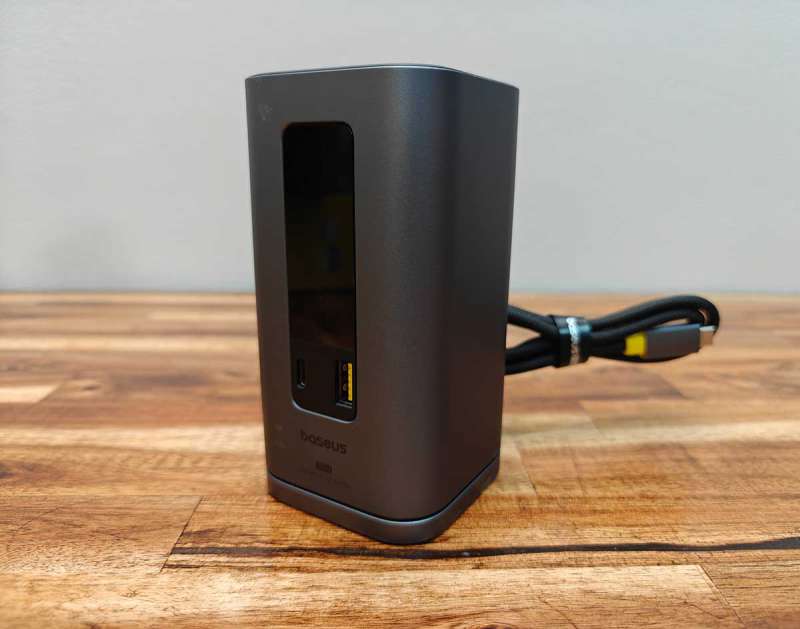
The design of the Baseus Spacemate docking station is very similar to the Baseus PowerCombo power strip that I reviewed. It has a tower shape that allows it to stand up vertically on your desk. It is 5 inches tall and 1.5 inches wide and deep.
The Spacemate has a sticker on the bottom of the base that will let you stick it to your desktop. But the base is also magnetic so that you can detach the dock. I think this is a strange feature and am not really sure why anyone would want or need it it. Let me know if you can think of a good reason for it.
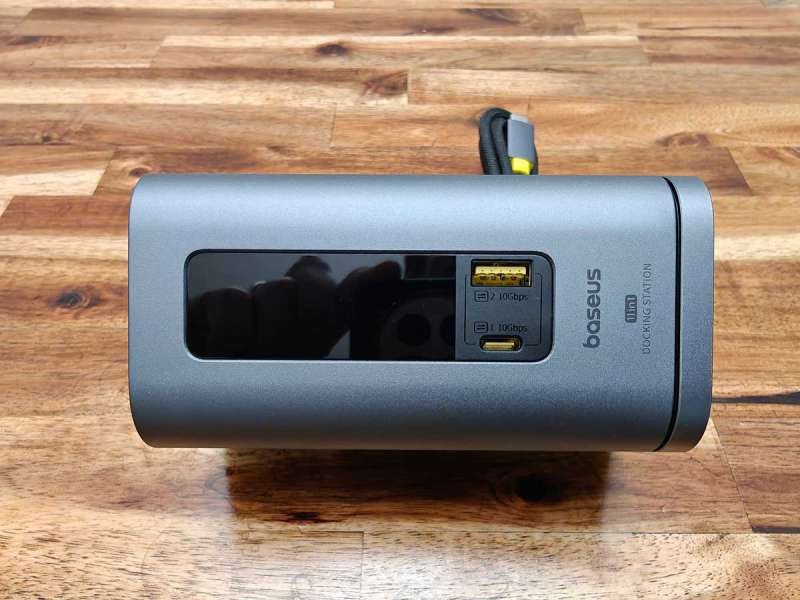
The front of the Spacemate has a status display that shows the connected ports. Below the display is a USB-C and a USB-A port.
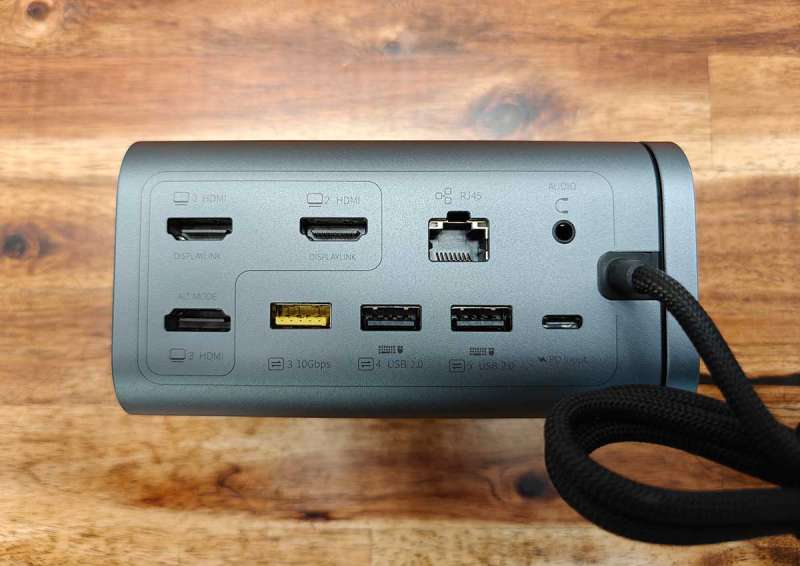
The back of the docking station has the rest of the ports and the built-in (non-removable) braided USB-C cable that you plug into your computer. There are 3 HDMI ports. One is the main HDMI port and the other two use Displaylink to display 2 additional monitors. For Mac users, you have to install the Displaylink software to use these ports. In addition to the HDMI ports, there are 3 USB-A ports, an Ethernet jack, a headphone jack, and USB-C PD (Power Delivery) port. The USB-C port is used to power the dock.
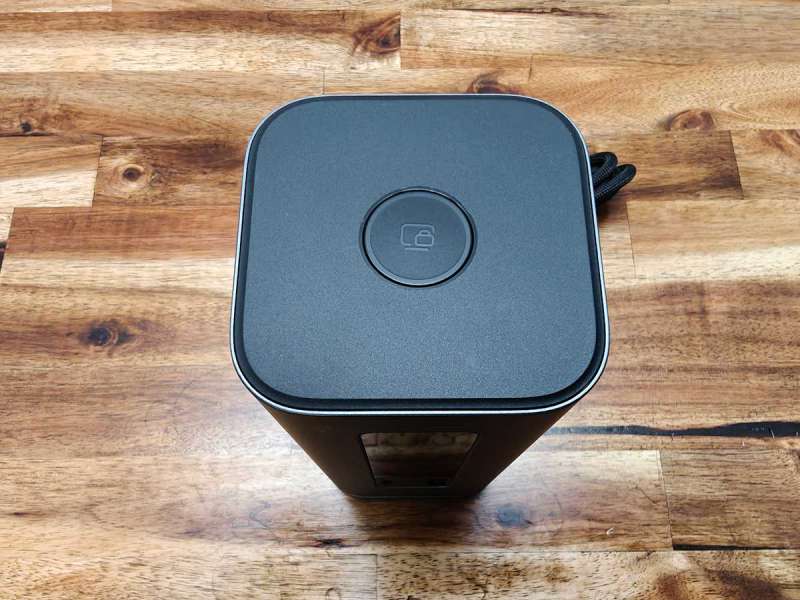
The top of the Spacemate has a button to lock your computer’s screen. On the Windows version of the Baseus Spacemate, you press it once to lock the screen, but with the Mac version of the dock, you have to press it twice to lock the screen. Pressing and holding the button powers down the dock.
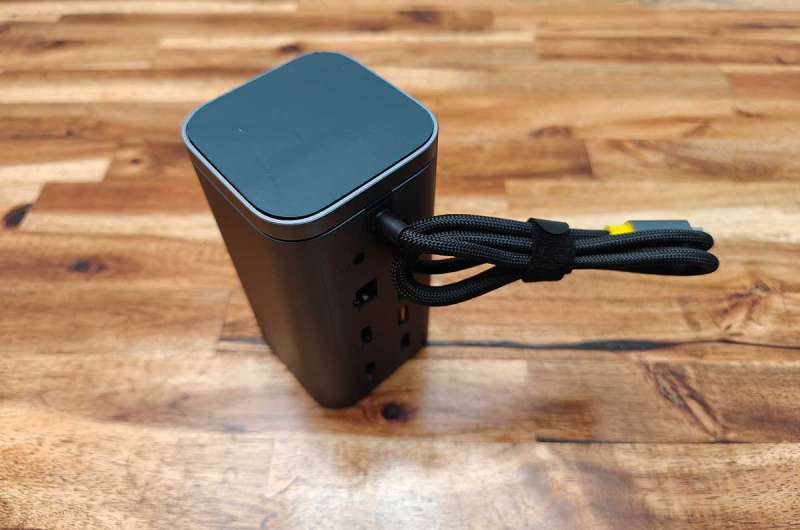
Guess what? Baseus does not include the cable or the AC adapter needed to power the dock. It’s up to you to supply that and you need to choose wisely. I tried a couple of different AC adapters and had poor success powering all my gear. When I finally used my existing MacBook power adapter, that did the trick. With it, I was able to connect:
- 14in M3 MacBook Pro
- Dell 49″ Ultrawide monitor
- Keychron Q1 HE mechanical keyboard
- Elgato Stream Deck
- Ethernet
- Small generic USB-C dock with HDMI, USB-A, 2x USB-C, headphone jack, SD card reader, and micro SD card reader (only really use the card readers)
I ran out of connections on the back and had to use one of the USB-A connections on the front of the Spacemate. That’s the problem, I think it needs more ports. I wish it had at least two more USB-A or USB-C ports, and I wish there was an SD card reader on the front.
Final thoughts
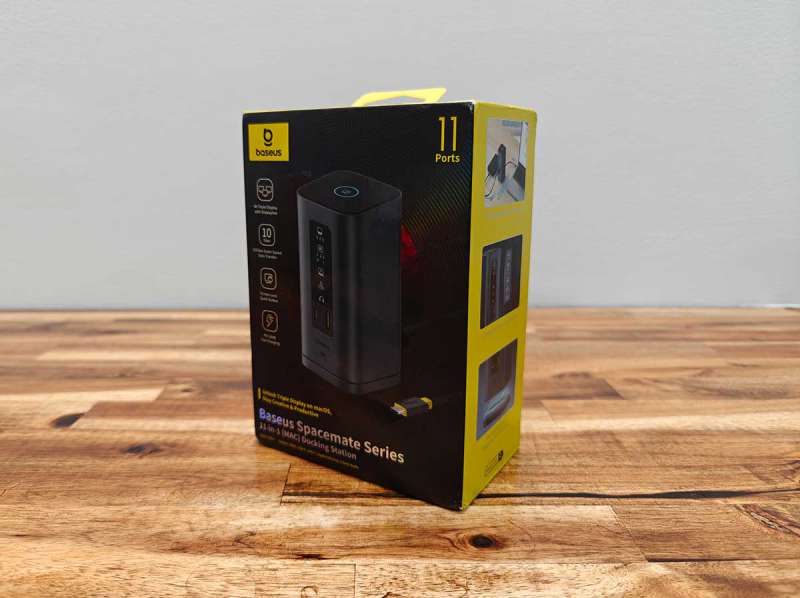
The Baseus Spacemate 11-in-1 docking station has simplified connecting my MacBook to all of my peripherals. The Ethernet connection option gives me better network speed than the WiFi to my basement office. The dock also makes it convenient to plugin additional monitors as long as you don’t mind installing the Displaylink software.
I like this dock quite a bit, but it’s not quite perfect because I feel like it needs a couple more USB ports and a card reader. But as is, I can recommend it, and I will continue using it until I find my unicorn docking station.
What I like about the Baseus Spacemate 11-in-1 docking station
- Tower design uses less desk space
- Easy to setup
- Ability to connect 3 HDMI monitors (needs Displaylink driver for 2 of them)
- Button on top locks screen
- One cable connection to the laptop
What needs to be improved?
- Power adapter and input cable are not included
- Needs more USB ports and a card reader to be “perfect” (for me)
Price: $199.99
Where to buy: Amazon
Source: The sample of this product was provided for free by Baseus. Baseus did not have a final say on the review and did not preview the review before it was published.
Check out these other docking station reviews!
- Kensington SD5000T5 WQ Thunderbolt 5 triple 4K docking station
- Choetech 7-in-1 Laptop Docking Station Stand
- iVANKY FusionDock Max 1 Thunderbolt docking station

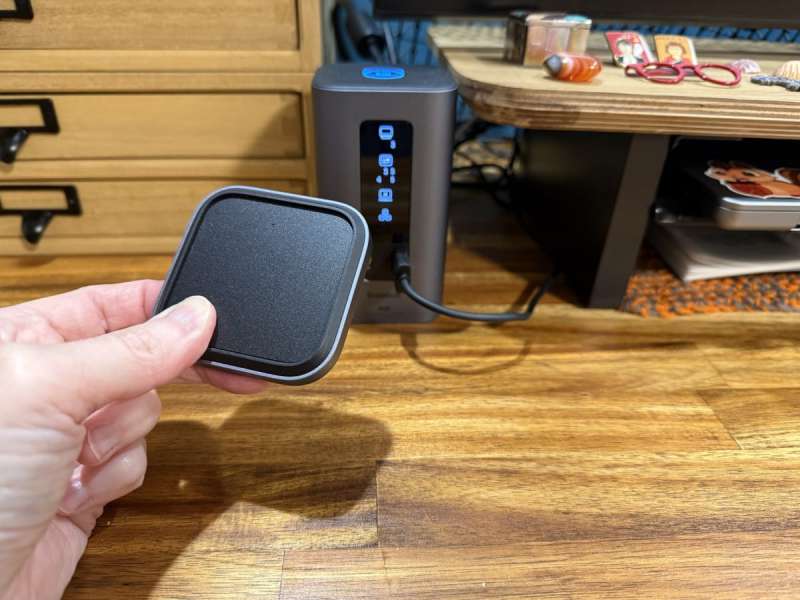
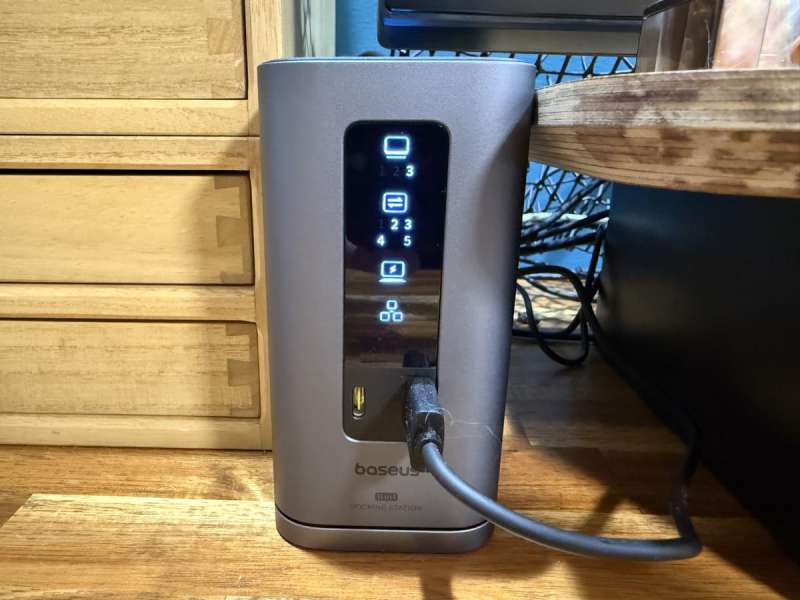
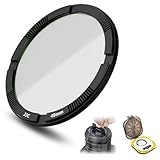

Gadgeteer Comment Policy - Please read before commenting
what do you suggest/like as a Mac power adapter
The one that came with your MacBook. If you’re not talking about MacBooks, then any 100W adapter should suffice. I like Anker, Baseus, and UGREEN as brands.